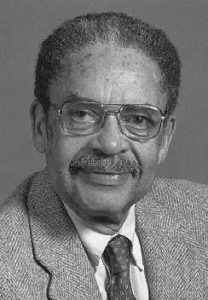
Philip G. Hubbard was born in Macon, Missouri, but moved to the Des Moines area when he was four years old. According to his book My Iowa Journey, his mother gave up her career as a teacher to move north so that Philip and his three brothers could attend unsegregated schools. While the schools were unsegregated for students, African American teachers were not allowed, so she instead found a job as an elevator operator. Hubbard’s mother was a major influence in his life, and she used her background in education to prepare him for school.
When he graduated from North High School in Des Moines, Hubbard considered several career paths, but ultimately chose engineering because it offered opportunities for advancement and could be finished in four years – which was all that Hubbard could afford. In addition, as a teenager he met University of Iowa College of Engineering alumnus Archie Alexander, who was living proof that an African American engineer could be successful.
Hubbard arrived in Iowa City in 1940 with $252.50 in savings and took on a job shining shoes in the basement of the Jefferson Hotel, where he would study between customers. College life provided new opportunities, but racism did keep him from enjoying all of them. For example, he had to find his own lodgings, as he was not to live in the dormitories. In his book, Hubbard notes that he was lucky at the College of Engineering. While his friends in other departments experienced racism within their colleges, Hubbard felt welcomed and supported, especially by Dean Francis M. Dawson, who helped him secure a work study position at the Iowa Institute of Hydraulic Research (IIHR).
Hubbard had no background in chemistry, as it was not offered at his high school. Seeking a challenge, he decided to major in chemical engineering. After a rough start, he would come to distinguish himself, winning the junior prize in chemistry and joining several honorary societies and fraternities. In May of 1943, Hubbard, who had joined the Enlisted Reserve Corps of the Army, was called up to report to Camp Dodge for active duty. As part of his service he was sent to Penn State where he took on study of electrical engineering. In 1944, Hubbard graduated with honors with a certificate in electrical engineering. In 1945 Dean Dawson arranged for him to leave the army and return to the University of Iowa to do military research. Hubbard received his degree in electrical engineering in January 1946. He would continue to work at IIHR, and earned his Masters in mechanics and hydraulics in 1949 and a Ph.D. in engineering in 1954.
Hubbard joined the faculty of University of Iowa, becoming an assistant professor of mechanics and hydraulics and continuing his work at IIHR as a research engineer. In 1959, he was promoted to full professor, becoming the first fully tenured African American professor at the University. During this time of growth in his career, Hubbard was working towards equality within the college and his field. In his memoir, he recalls being invited to speak at a conference in Vicksburg, Mississippi in 1951. After initially accepting the invitation, Hubbard had to turn it down, as the hotel had strict segregation rules. While Hubbard would have been allowed to speak, he would have had to take the service elevator to the room to present his speech then leave immediately after. Hubbard turned down this opportunity, noting that this situation was “unacceptable.”
In 1966, Hubbard was chosen to serve as Dean of Academic Affairs, which made him the first African American Dean at any of Iowa’s state universities. In 1971, he would achieve another first when he was named as Vice President of Student Services, which made him the first vice president at any Big Ten university. He used these positions to advocate for minority students, establishing Opportunity at Iowa to help retain minority students and faculty. He would retire from the university in 1990, having worked there for 43 years. In 1991, the field next to the Iowa Memorial Union previously known as Union Field was renamed Hubbard Field in his honor.
Hubbard passed away at the age of 80 on January 10, 2002. If you want to learn more about Hubbard’s life in his own words, you can read his book online through the Iowa Digital Library.
Works Cited
Hubbard, P. G., & Stone, A. E. (1999). My Iowa Journey: The Life Story of the University of Iowa’s First Tenured African American Professor (1st ed.). University Of Iowa Press.
Philip G. Hubbard Papers, The University of Iowa Libraries, Iowa City, Iowa. https://aspace.lib.uiowa.edu/repositories/3/resources/1297 Accessed February 10, 2022.
University of Iowa College of Engineering. (n.d.). Philip G. Hubbard. College of Engineering – The University of Iowa. https://engineering.uiowa.edu/alumni-and-friends/awards-alumni-and-friends/honor-wall/legacy-iowa-engineering/philip-g-hubbard